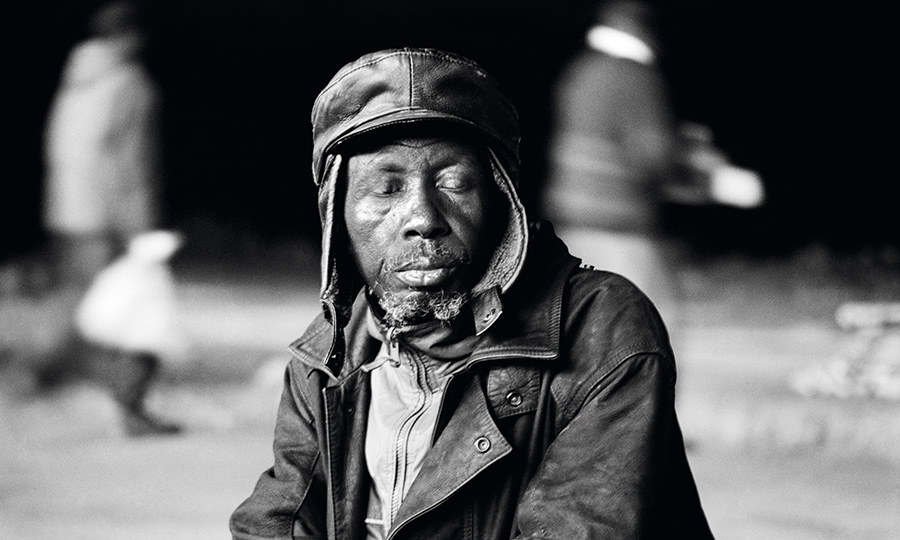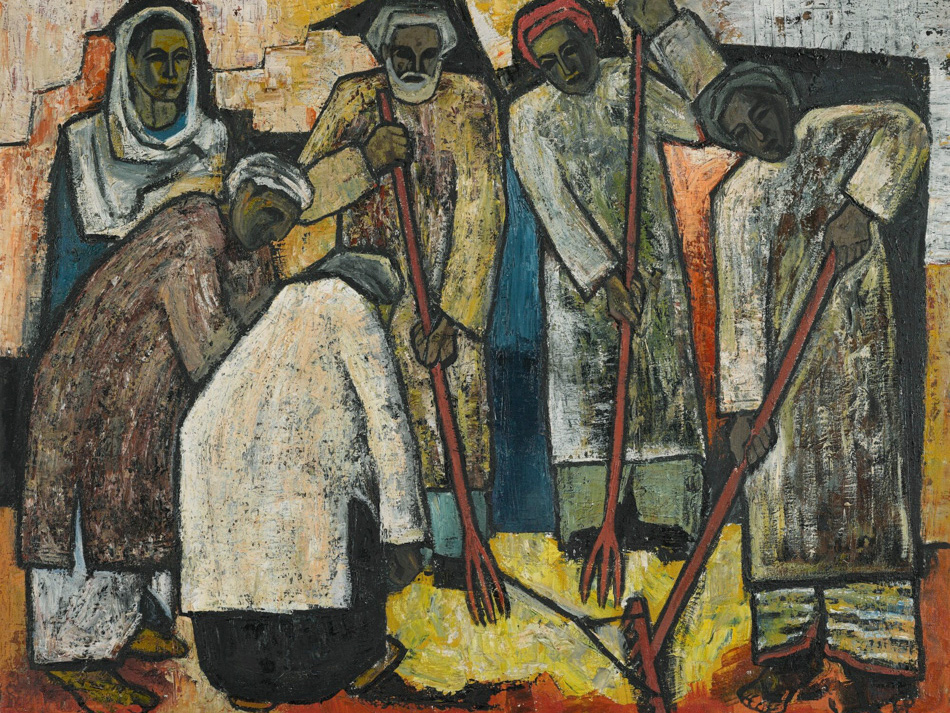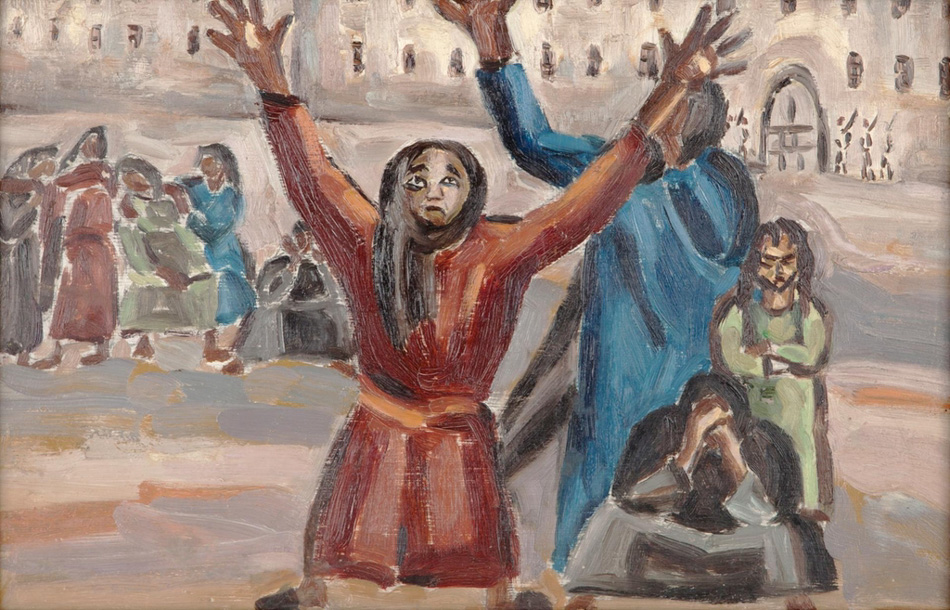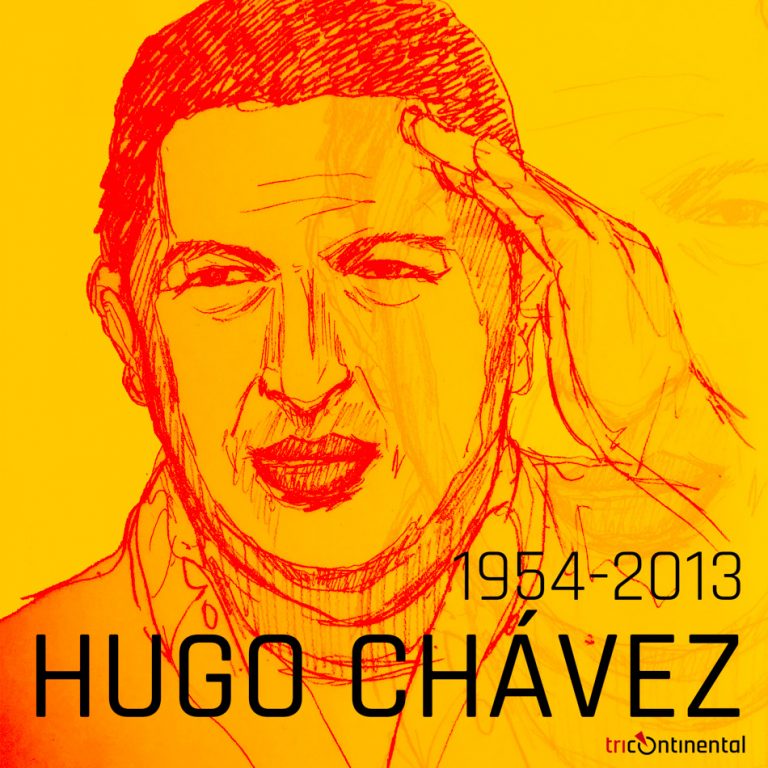Vijay Prashad reflects on neoliberal orthodoxy, the latest meeting of tired decision makers in Davos and a hybrid war in Latin America that is creating the conditions for chaos.

Santu Mofokeng, “Eyes Wide Shut,” Motouleng Cave, Clarens – Free State, 2004.
By Vijay Prashad
Tricontinental: Institute for Social Research
 On Monday, Jan. 27, the South African photographer Santu Mofokeng slipped away. His camera had been a familiar presence in the anti-apartheid struggle; after years of photographing police violence and popular resistance, he tired of making “images bespeaking gloom, monotony, anguish, struggle, [and] oppression,” he wrote in 1993. It was then that Santu turned his camera on the life of the black working class. “Perhaps I was looking for something that refuses to be photographed,” he said. “I was only chasing shadows, perhaps.” Those who search for the future chase shadows.
On Monday, Jan. 27, the South African photographer Santu Mofokeng slipped away. His camera had been a familiar presence in the anti-apartheid struggle; after years of photographing police violence and popular resistance, he tired of making “images bespeaking gloom, monotony, anguish, struggle, [and] oppression,” he wrote in 1993. It was then that Santu turned his camera on the life of the black working class. “Perhaps I was looking for something that refuses to be photographed,” he said. “I was only chasing shadows, perhaps.” Those who search for the future chase shadows.
When the future is bleak, you feel like shutting your eyes.
In mid-January, the UN Conference on Trade and Development (UNCTAD) released its flagship report, World Economic Situation and Prospects 2020. The main theme of the report is that global growth rates this year will be unimpressive, and that the most powerful states will once more rely upon lowering interest rates to provide liquidity into markets. There is a fundamentalist view amongst mainstream economists and bankers that the entry of capital into markets will lead to investment, which can then raise growth rates. As UNCTAD shows, this is an illusion, since liquidity can move to financial markets and not into investments in either manufacturing, the service sector, or into financing human needs. “Overburdened monetary policies,” UNCTAD’s report notes, “have proven insufficient to stimulate investment, which in many countries is being held back less by financing costs than by uncertainty and a lack of business confidence.”
An enormous amount of global debt has been “channeled into financial assets rather than into raising productive capacity – illustrating a worrying disconnect between the financial sector and real economic activity.” Even when capital has gone into the manufacturing sector, it has not necessarily increased employment; the phenomenon of “jobless growth” has often been its outcome. Capital has been flowing into negative-yielding sovereign bonds, which shows that capital markets are pessimistic about future economic growth. It is a signal of deep distress in the current system, as we pointed out in our January Dossier no. 24, “The World Oscillates Between Crises and Protests.”
Given the lack of growth rates, the Central Banks’ solution has become to reduce interest rates. The U.S. Federal Reserve Bank — as the banker of last resort — has dropped rates once more. The rate sits between 1.5 percent and 1.75 percent, which gives the Federal Reserve very little room to drop rates further if there is another financial crisis or even a deeper slowdown. “Overreliance on monetary policy,” UNCTAD’s economists write, “is not just insufficient to revive growth; it also entails significant costs, including the exacerbating of financial stability risks.” Low interest rates allow financial markets to borrow in a situation where risks are under-priced; as a result, more reckless behavior is evident in financial markets, assets are overpriced, and global debt will likely skyrocket.

Ali Imam, “Farmers,” 1950s.
Since the rise of neoliberal orthodoxy, governments have been urged to use only monetary policy — such as the manipulation of interest rates — as a means to intervene in the economy. Fiscal policy — such as using the budget to raise funds for public spending — has been seen as an inefficient way for governments to act; instead, they are encouraged to cut taxes and lower spending. If private capital is not making the necessary investments in society, then governments need to raise funds to use for substantial public investments. In other words, as UNCTAD puts it, this would entail “aligning policy to decarbonise energy, agriculture, and transport; undertaking targeted infrastructure investment to broaden access to clean and renewable energy, clean water, and transport links; and supporting equal opportunities in access to high-quality education, health care, and formal employment.”
Nothing like this held the attention of the tired decision makers who flocked to the World Economic Forum in Davos, Switzerland. They talked about climate change as if it were a new issue, and as if it could be looked at in isolation from the tidal waves of financial instability and the deserts of capital investment that threaten the lives of billions of people. Each year, for the Davos participants, Oxfam releases its stunning report on global inequality. This year’s report shows that the world’s 2,153 billionaires have more wealth than the 4.6 billion people who make up 60 percent of the planet’s population. There are some numbers in this report that are so confounding that they should be read over and over again:
- The richest 22 men in the world have more wealth than all the women in Africa.
- The world’s richest 1 percent have more than twice as much wealth as 6.9 billion people.
- If you saved $10,000 a day every day since the pyramids were built in Ancient Egypt roughly five thousand years ago, today you would have only one-fifth the average fortune of the five richest billionaires.
- Women and girls put in 12.5 billion hours of unpaid care work each and every day, contributing at least $10.8 trillion a year to the global economy — more than three times the size of the global tech industry.

Inji Efflatoun, “Prisoners,” 1957.
Given these disparities, it is no wonder that the Davos conversations are arid, even otherworldly. Two economists write from Davos of the positive signs in this economy, taking shelter behind the cessation of trade hostilities between the United States and China and emphasizing an increase in consumer spending. Nothing here about inequality or the fact that consumer spending is based on cheap credit and high debt. The economists end their note with a peculiar statement: “More local concerns, such as riots in Latin America and faltering growth in India are also worrisome.”

Silvano Lora, “Vietnam,” 1971.
Riots in Latin America? Rather, the core of the unrest that we see in Latin America points to a range of regime change operations (that overthrew the government in Bolivia, and that attempted – and failed – to overthrow the government in Venezuela) and State repression against protestors (in Chile and Ecuador). What violence one sees in Latin America has been imposed on the hemisphere by imperialism and the local oligarchy. To call them “riots” makes them see anarchic; they are, in fact, the objective consequence of State policy dictated from Washington and from the gated communities of the Latin American oligarchies that seeks to destabilize the region and maintain control in the hands of the rich.
A year ago, the United States and its allies in the Lima Group attempted a coup d’état against the government of Venezuela. The hybrid war against the Venezuelan people grew around a sanctions regime that has forced the Venezuelan economy to contract sharply, and that has killed at least 40,000 people. This war on Venezuela has created extreme instability in all of Latin America, but particularly in neighboring Colombia.
In a brief statement, the UN’s high commissioner for human rights pointed to the “staggering number” of assassinations of leaders of social and political movements. The killers, the UN suggests, are “criminal groups and armed groups linked to illicit economies in areas vacated by the FARC-EP.” In other words, right-wing paramilitary groups and their affiliated drug gangs have taken advantage of the peace treaty signed by the Left to terrorize the countryside. In the Tricontinental: Institute for Social Research dossier on Colombia (December 2019), the argument is made that the Colombian oligarchy does not want to move toward peace because this would shift the needle of Colombian politics toward the people’s movements and the Left. The continuation of the war — now through assassinations and intimidation — favors the oligarchy. They prefer this violence to democratic politics. On Jan. 21 the people of Colombia returned to the streets for another general strike with a list of demands that runs from an end to neoliberal economic policies to shutting down the repressive police units that operate like death squads.

João Pedro Stédile of the National Board of the Landless Rural Workers’ Movement of Brazil (MST) offers a 20-point assessment of the failed coup in Venezuela, which has at its heart the disorientation within the right-wing opposition to the Bolivarian process initiated by Hugo Chávez in the 1990s. The preferred regime change candidate from Washington, Juan Guaidó, has lost the support of a deeply fragmented opposition group in Venezuela after a year of attempts to overthrow the government. Guaidó — formerly the president of the National Assembly — was replaced by Luis Parra in a vote on Jan. 5. Parra, though still a member of the opposition, has been deemed an unacceptable puppet replacement by the United States, which promptly sanctioned him and encouraged Guaidó to continue his personal rebellion. This is the oligarchy-instigated “riot” that is creating chaos in parts of Latin America: the riot of the rich to wreak havoc on the lives of the poor and working class.
In 1964, when Colombia slipped once more into its seemingly endless series of wars, the iconoclastic poet Jotamario Arbeláez wrote a moving poem about the time ‘after the war’ (translated by Nicolás Suescún),
a day
after the war
if there is a war
if after the war there is a day
I will hold you in my arms
a day after the war
if there is a war
if after the war there is a day
if after the war I have arms
and I will make love to you with love
a day after the war
if there is a war
if after the war there is a day
if after the war there is love
and if there is what it takes to make love
Today there is a hybrid war and there is an economic war that create the conditions for chaos.
There is an economic war against the planet, one that has no anti-war movement.
This economic war deforms human aspirations, empties out dreams and breaks hopes. If that richest 1 percent — which has more than twice as much wealth as the planet’s 6.9 billion people — just paid 0.5 percent more in taxes, it would raise enough investment to create 117 million jobs in the fields of education and healthcare, in childcare and elder care. In 2016, UNESCO pointed out that if the world were to meet the Sustainable Development Goal on education, countries of the world would have to recruit at least 68.8 million teachers over the next decade and a half – 24.4 million primary school teachers and 44.4 million secondary school teachers. This demand has slipped under the table.
How far are we from the day after the war?
Vijay Prashad, an Indian historian, journalist and commentator, is the executive director of Tricontinental: Institute for Social Research and the chief editor of Left Word Books.
This article is from Tricontinental: Institute for Social Research.
The views expressed are solely those of the author and may or may not reflect those of Consortium News.
Please Donate to Consortium News.
Before commenting please read Robert Parry’s Comment Policy. Allegations unsupported by facts, gross or misleading factual errors and ad hominem attacks, and abusive or rude language toward other commenters or our writers will not be published. If your comment does not immediately appear, please be patient as it is manually reviewed. For security reasons, please refrain from inserting links in your comments, which should not be longer than 300 words.

The truth is there and avilable by many Authors and independent News Channels.
#Carmen Santiago
Low interest rates as monetary policy is just stimulus of last resort, when governments otherwise fail to stimulate their own economies when needed. It is a symptom of failed government. That in turn is a symptom of government capture by wealthy elites, who use government only to serve their own narrow, selfish interests.
From the article
“The economists end their note with a peculiar statement: “More local concerns, such as riots in Latin America and faltering growth in India are also worrisome.”
These pronouncements are propaganda by global banks and fossil fuel corporations that whitewashed news via the US media concealing their hands in their attempts to overthrow democratic governments in South America purely to gain control of fossil fuels beyond their wildest dreams.
Venezuela sits on top of the largest proven reserves of petroleum on the planet.
There is no more basic reasoning of American foreign policy than its attempts to grab up petroleum resources found in foreign nations.
That is what the wars or potential wars the US is fomenting are all about.
Venezuela and Iran nationalized their natural resources which is damnable offense. Our native instinct to grab up all the oil during the current administration has seen Rex Tillerson and Mike Pompeo as secretary of state and whether the chief foreign policy advisor was a former head of Exxon or the darling of the Koch Brothers the aim has been the same to get all the oil for the benefit of billionaires and global petrochemical corporations.
Recently Bolivia had a coup d’état since it has vast resources of Lithium needed to feed a battery fueled future economy. It is true that the fossil fuel corporations must change their business models and they will need to rely on a plentiful supply of lithium to grow the next generation economy based on battery operated machines. Nothing new here especially that the US is positioning itself once again to grab up foreign resources by force with its ability to overthrow governments that seek to nationalize their resources.
This is all quite normal behavior based on century’s of conquest by former or current empires. Spain and the hunt for Gold etc. But we should not see these power grabs as anything other than what they are. There is no democracy or freedom being extolled on the population of these resource rich nations. The aim is to extract the wealth without paying a dime.
Marvellous stuff, as always, from Vijay one of our most consistent and courageous truth tellers.
As to the Lima Group it is headed by Canada and is the brainchild of Chrystia Freeland, whose grandfather was a Nazi, part of the notorious Frank regime in Poland most often remembered for its Auschwitz-Birkenau death camp complex. He had better alibis for his criminal associations than his granddaughter from Alberta does.
Have read and listened of writings, songs and poetry from thousands of years and the misery of then remain still as miseries of today.
The soft words needed hard force, to bri g about temporary change, not so much of now but dreams of futures where misery ends, they all failed and are almost completely gone from today.
An old prophet from a distant path gave the meek a promise, “they shall inherit the earth”, and each generation awaited until they were gone, promise unfulfilled.
And now today man watches the earth itself dying, as each rips from it before others can, wanting his Nigerian now tired of waiting for a la la land.
For the meek get what others leave behind, that which they live and will die, to produce the goods upon the tables in tbe palaces of the non meek, and with the crumbs are satisfied.
As was of old has never aged, as it was then is today.
When the arms of the meek not await to hold their dead, but embrace each of we meek alive today, only then will we save not our inheritance but an inheritance worthy of claim by our decendents.
I hope Vijay’s wonderful article DOES reflect the views of CN!
“There is an economic war against the planet, one that has no anti-war movement.”
“If that richest 1 percent — which has more than twice as much wealth as the planet’s 6.9 billion people — just paid 0.5 percent more in taxes, it would raise enough investment to create 117 million jobs in the fields of education and healthcare, in childcare and elder care.”
If only those in power used their power for this change and that the rest of us could push them to do so.
Thanks for declaring so much truth hidden by the corporate media. keep on! Poor people from Latin America desperately needs it.
A very depressing, but, a terribly realistic overview of reality.
I would only disagree (a little) with a couple of points:
“Even when capital has gone into the manufacturing sector, it has not necessarily increased employment; the phenomenon of “jobless growth” has often been its outcome.” Indeed I would argue that this *is* the intended outcome. Fewer actual human workers on shop floors is considered to be cheaper than investment in ever more mechanization (nowadays robotization) of the production process. And the corporate-capitalist-imperialists are not as interested, it appears given how “wages” have stagnated/depreciated over the past 50 or so years, in enabling the workers or would-be workers to buy their products.Moreover, more money is made in “finance,” “investment,” and what have you than in actually producing goods, let alone durable ones, building dwellings, providing a decent life for everyone at all levels of the socio-economic ladder.
How many of those employed (I use the term loosely) are technically “employed”? Many, millions in the UK and US for sure, are “sub-contracted self-employers” – my late husband was (teaching on-line) and my brother is (farm work and stone yard). So their (really existing) “employers” do not pay toward FICA/National Insurance, you – the technical self-employer – do, the whole lot. No sick pay, no vacation pay….
And “If that richest 1 percent — which has more than twice as much wealth as the planet’s 6.9 billion people — just paid 0.5 percent more in taxes, it would raise enough investment to create 117 million jobs in the fields of education and healthcare, in childcare and elder care.” The latter portion of this conclusion I have questioned above. The first – how many of these people in the 1% (I would add the remaining 9) actually paid taxes at *any* percentage level? For example, Bezos doesn’t, not one cent.
The 1% – 10% do not care *at all* what happens to the millions, billions of people who cannot find sufficient work, cannot scrape together enough money to eat and shelter and clothe themselves and their families, let alone afford healthcare, education. These are the same people who make fortunes out of investing in the production, selling and use of the machinery to slaughter people, who happily sanction people, nations, in order to bring them into line with their rapacious demands, whether it starves to death millions or not.
Who would have thought the theories of Stanley Jevons, Leon Walras and Karl Menger – the so-called ‘Marginalist School’ would produce the economic consequences as outlined above. I have always thought that neo-classical economics was little more than militant class struggle. Now I know it.
”In France and England the bourgeoisie had conquered political power. Henceforth the class struggle, practically and theoretically, took on more and more outspoken and threatening forms. It sounded the knell of bourgeois economy. It was thenceforth no longer a question whether this theorem or that was true, but whether to useful to capital or harmful, expedient or inexpedient, politically dangerous or not. In place of disinterested inquirers, there were hired prize fighters; in place of genuine scientific research, the bad conscience and evil intent of the apologetic.”
Karl Marx – Capital, Volume, 1. Afterword to the Second German Edition. 1873
I believe this is from Counterpunch:
+ The DOW:
2017 – 19819.78
2018 – 23,062.40
2019 – 28,583.44
– Gain of 44.2%
Median Household Income:
2017 – $62,626
2018 – $63,179
2019 – $63,688
– Gain of 1.6%
Mininum Wage:
2017: $7.25
2018: $7.25
2019: $7.25
– Gain of 0.0%
When the return is 44% in the “Casino” (with half of the money sitting in bonds instead awaiting the next crash) NO INVESTOR is going to put money into jobs or productivity (almost all start ups fail!) If our fiduciary debt peonage economy fails, the FED will simply bail it out again ($29 Trillion under Obama, constant $billions injected under Trump). There is no hope in the West!
Fantastic article.
Not surprisingly, since it has not played in the MSM, is no mention here of President Trump’s speech at Davos. A calm measured speech daringly given, telling these filthy rich people that it is time to wake up and know that the people of their country deserve recognition of all the hard work they do and deserve respect. Look at the Doma of Florence as one example of the everyday person’s feats. This speech reminded me so much of a couple of different speeches JFK gave.
Bravo!
Give oxygen and words and visuals to the murder of individuals and nations in South America.
Keep writing.